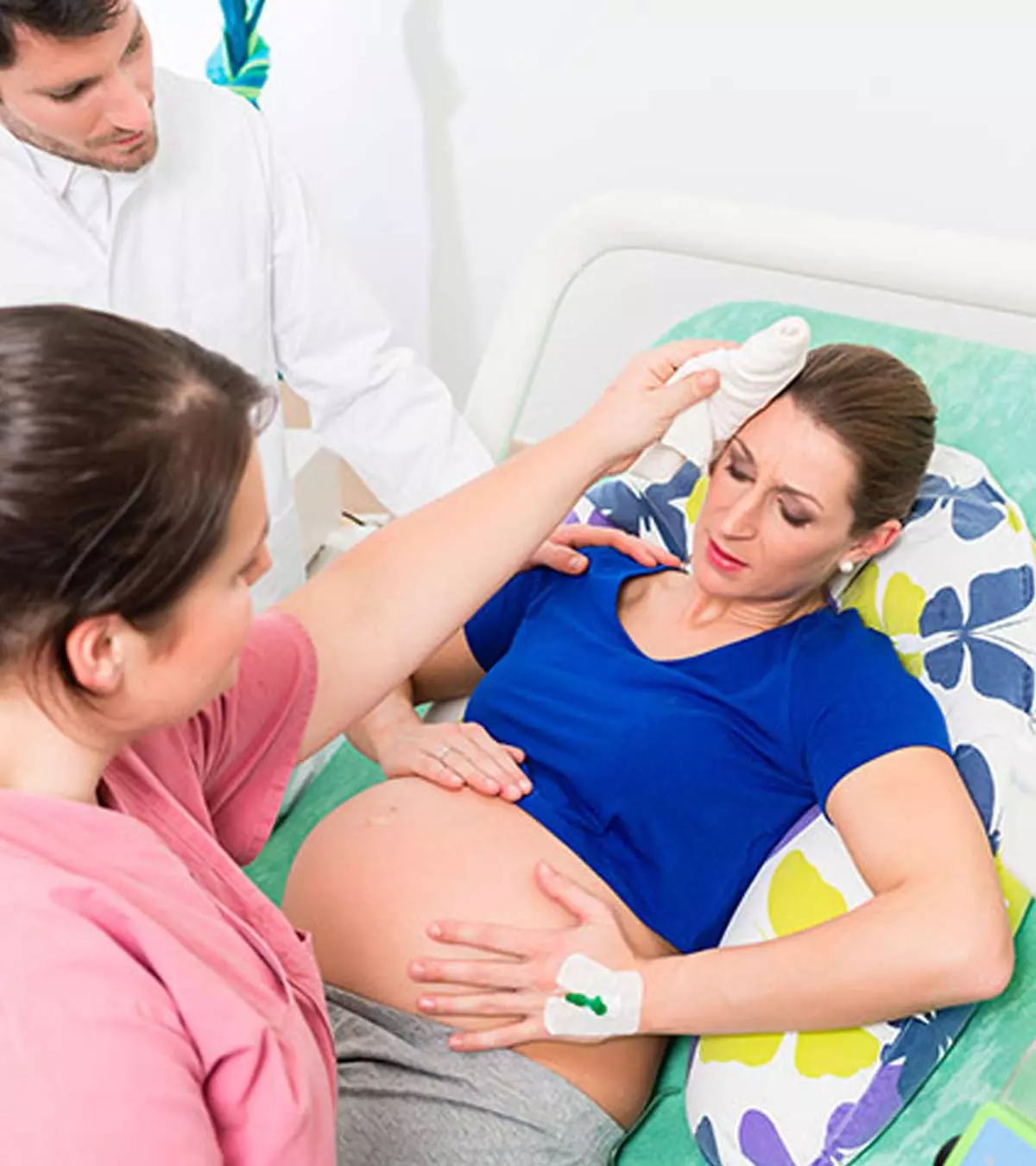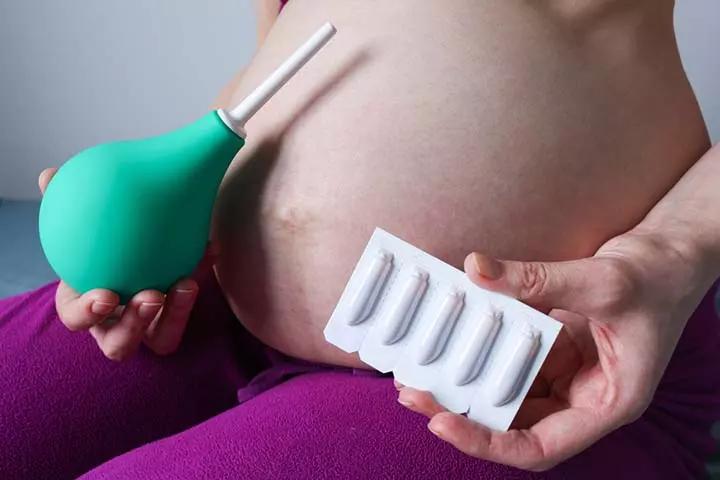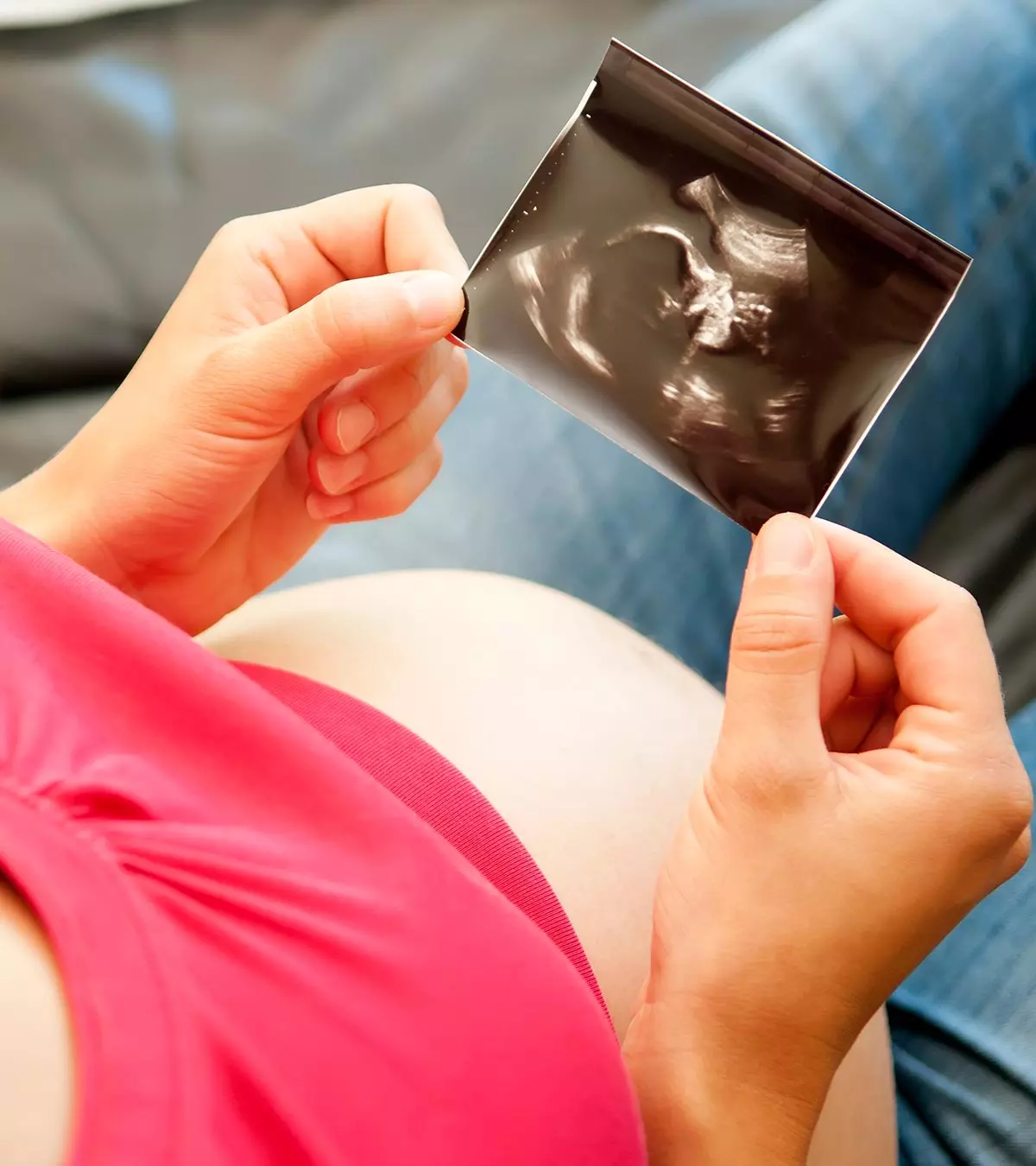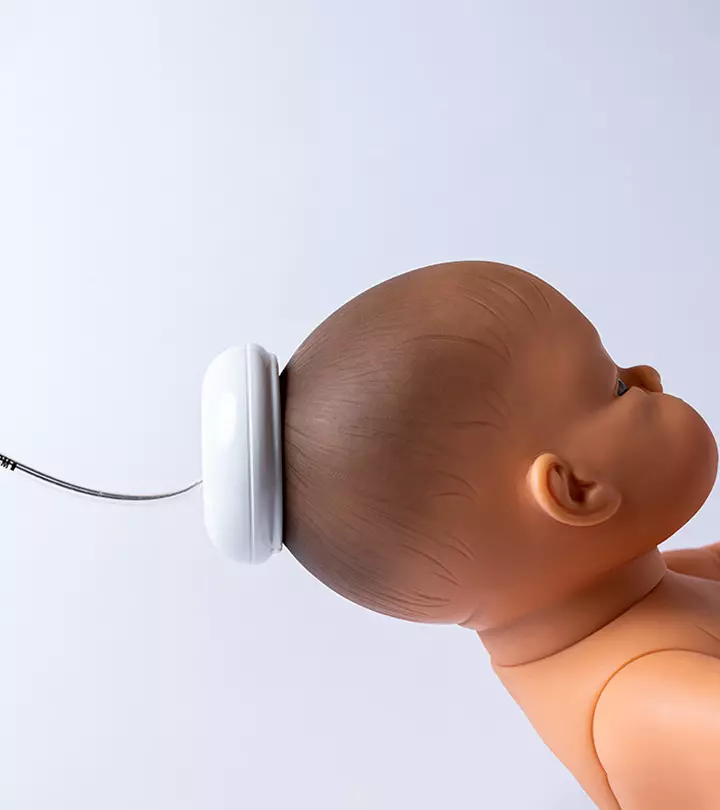
Image: ShutterStock
Scientific research does not support the use of enemaiAn injection of fluid through the anus to help clear out stool or waste material. during labor anymore because it believes that the technique is ineffective in preventing maternal and neonatal risksiThe risk of a newborn being affected by a disease or adverse condition. of infections (1).
That said, doctors may still recommend enemas to women based on their conditions. For example, it may shorten labor pain, relieve bowel issues, or benefit women with constipation before labor. However, since each pregnancy is different, you should discuss your issues with your midwife or gynecologist and decide whether you need an enema or not.
Read this post to understand why enema is used during labor and why it is not recommended for all women.
Key Pointers
- The use of enema during labor is a controversial topic among medical professionals.
- Scientists have found that the technique is ineffective in preventing maternal infections.
- Moreover, enema is also not effective in reducing labor time, which can lead to high expenses and discomfort for the patients.
- However, some doctors still suggest Enema to relieve bowel problems and constipation, and to reduce fecal contamination, which can help avoid wound infections.
Why Is Enema Not Recommended Before Labor?
Administering enema during labor is not recommended due to the following reasons (2) (3).
- Discomfort: Some hospitals support the routine use of enema to deliver laxatives for defecation during labor, even when it is not required. Rarely, administration of enema might cause rectal injury leading to rectal bleeding. This can cause discomfort for some women, and hence, it is not recommended for all.

- Increased delivery cost: Enema before labor is known to increase the overall cost of delivery, which is not feasible for many.
- Ineffectiveness: Enema has not shown any effects on reducing the duration of labor; hence, WHO does not recommend routine use of an enema to reduce the duration of labor. There is no evidence supporting the use of enema to induce labor.
Apart from the above-mentioned disadvantages of enema, such as discomfort, rectal injuries, increased cost of delivery, and ineffectiveness in reducing labor, there are some lesser-known associated risks as well. Studies done on women in labor detail that enema likely puts the mother and baby at a risk for infections in the postpartum phase due to watery fecal soiling during labor. In addition, rare but severe adverse outcomes such as septic shock and perforations of the rectosigmoid colon due to cleansing enemas are also a possibility. Further, enemas are also known to add to the workload of the delivery ward staff concerning post-delivery clean-up. However, these studies also detail the need for further observations and a critical understanding of these disadvantages (4). Hence, the decision to use an enema is best made collaboratively by the patient and healthcare provider, considering individual health conditions and preferences.
Why Is Enema Still Given for Some Women During Labor?
Doctors may recommend enema for those who have constipation before labor. Passing stool is a normal occurrence during labor or delivery. Around 25% of women may experience what is called fecal incontinence or accidental bowel movement when they are in labor (5). To avoid this and save themselves from the embarrassment, some women prefer to get enema during labor.
Here are a few reasons why enema could be given during labor.
- Reduces fecal contamination: According to a study, pregnant women who were given enema using proper technique had reduced fecal contamination rates compared to those who did not get an enema. Fetal contamination could cause neonatal infection and perineal wound infectioniAn infection from wounds in the bottom region of the pelvic cavity formed due to injury or tumors in the genital area .

However, another study found no difference in the fecal contamination rate between the enema and the non-enema groups (6). The risk of fetal contamination doesn’t hold for all pregnant women, which is why enema is not necessary for everyone.
- Shortens labor period: Giving enema before the onset of labor could shorten the duration of labor as the back passage becomes empty, creating more space for the baby to move out. But there is no proper evidence to prove it (2)(6).
- Relieves bowel problem: In case the bowels have not opened for 24 hours, enema could ease out that discomfort before the beginning of labor. If not done so, the bowel movement after the process of delivery could cause discomfort to the women, especially if she has an episiotomy procedure for cervical dilation of her perineum. Moreover, if the mother is having a cesarean section, enema will be useful as they don’t have to put pressure on rectum in passing the stool.An anonymous mom blogger was initially worried but later grateful for receiving an enema during her pregnancy. She now recommends it to all expectant mothers in labor. She says, “Prior to the day, I spent more than a few minutes worrying about the whole bathroom/delivery table scenario, I was petrified. Even though any labor and delivery nurse will tell you it’s ‘no big deal and you won’t even know it happened’, it was still awful to worry about. So ‘hello enema’ nice to meet you. How wise. I would recommend this to all women in labor, we’ll leave it at that (i).”
That said, enema does not help every case of constipation. For instance, women who have anirritable bowel diseaseiA chronic intestinal and stomach disorder characterized by cramping and constipation. or intestinal obstruction are not recommended an enema (6)& ;(7).
Frequently Asked Questions
1. Can enema cause contractions?
Yes, an enema is believed to make contractions stronger. Thus, it may speed up labor. However, giving enema during childbirth is discouraged unless your obstetrician decides its necessity (8).
2. Are enemas painful?
Some studies mention that giving enemas during labor may increase the pain and interfere with the pain management; however, more research is required to confirm the fact (9).
3. How long will the effect of the enema continue?
Enema starts working within a few minutes, and the effect continues for around one hour. You should stay near the restroom because you may have to use it more than once (10).
4. Does an enema hurt a baby?
Studies reveal that enema may not be associated with any potential adverse pregnancy or fetal distress or outcomes (11).
The administration of enema during labor may vary each time and for each woman. Although there is no scientific evidence that enema assists in labor, a few hospitals may suggest it relieves any gastrointestinal discomfort before the delivery. However, due to the limited studies on the proven efficacy of enema, it is up to you and your medical professional if you should receive it. Therefore, talk to your gynecologist before the delivery date arrives to know if an enema would be a viable option for you.
Infographic: Advantages And Disadvantages Of Enema During Labor
The use of an enema during labor is still a debatable subject among medical professionals. While some argue for its benefits, others raise concerns about its potential discomforts and effectiveness. Scour through this infographic to learn about the pros and cons of an enema during labor, and consult your OB-GYN if you have any further concerns. Illustration: Momjunction Design Team
Illustration: Should You Have Enema During Labor?

Image: Dall·E/MomJunction Design Team
Personal Experience: Source
MomJunction articles include first-hand experiences to provide you with better insights through real-life narratives. Here are the sources of personal accounts referenced in this article.
i. Olivia’s birth story;https://atticlace.blogspot.com/
References
1. Reveiz, et al.; Enemas during labour; US National Library of Medicine;
2. WHO recommendation; The WHO Reproductive Health Library
3. Effects of high-volume saline enemas vs no enema during labour; BMC Pregnancy And Childbirth
4. Ludovic Reveiz et al.; Enemas during labour; Cochrane Database Syst Rev. (2013)
5. Managing Incontinence During Pregnancy And After Childbirth; National Association For Continence
6. Kovavisarach and W. Sringamvong;Journal of the Medical Association of Thailand (2005)
7. Constipation; Virginia Mason Hospital and Medical Center
8. Home methods for starting labor; Hesperian health guides
9. Ludovic Reveiz et al.; Enemas during labour; Chocrane Library (2013)
10. Guidance for using an enema; King’s College Hospital; NHS
11. Enemas during labour; Cochrane.
Community Experiences
Join the conversation and become a part of our nurturing community! Share your stories, experiences, and insights to connect with fellow parents.
Read full bio of Dr. Sangeeta Agrawal
Read full bio of Rebecca Malachi
Read full bio of Swati Patwal
Read full bio of Aneesha Amonz

















